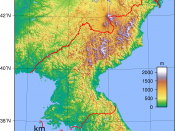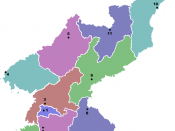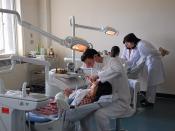Abstract
North Korea has not been able to provide enough food to feed its population properly since 1995 after successive years of floods and droughts wiped out farmland, crops and food supplies. The economy was already in a state of decline following the loss of trade with the Soviet Union and other eastern European countries when those country's socialist systems of government collapsed. Access to cheap fuel, resources and other necessary equipment from those countries was cut off and much of this was for use in agriculture.
The industrial sector is in a precarious state, with obsolete machinery and suffering from critical shortages of spare parts and raw materials, while the agricultural sector is plagued by shortages of inputs compounded by adverse weather conditions. In order for the present circumstances to improve and bring about a reversal of the downward economic trend, major efforts are needed with assistance from the international community towards rehabilitating industries, infrastructure, and the agricultural sector.
In the agriculture sector, the old and broken farm machinery and damaged irrigation system needs fixing and regular supply of fertilizers, agro-chemicals and plastic sheets need to be ensured on a regular basis.
This report focuses on the effects of the floods and droughts that have plagued North Korea since 1995 and provides recommendations to the Asian Development Bank for how to rehabilitate the agricultural system so that North Korea is back in a position to be able to feed its population properly.
Introduction
North Korea is a country in eastern Asia with a population of about 22 million. It is one of two countries that lie on the Korean Peninsula, which extends south from northeastern China. North Korea covers the northern half of the peninsula, and South Korea occupies the southern half, with a population of around 47 million...



Good essay
This is a very informatic essay. Good work.
1 out of 2 people found this comment useful.